Former Australian Prime Minister Malcolm Turnbull said Beijing will lift its trade ban on Australia as it looks for a way out of the failure of its trade sanctions.
The 29th Australian prime minister was speaking at an online forum on “Responses to China’s Economic Coercion” hosted by the Alliance of Democracies Foundation on Feb. 6.




